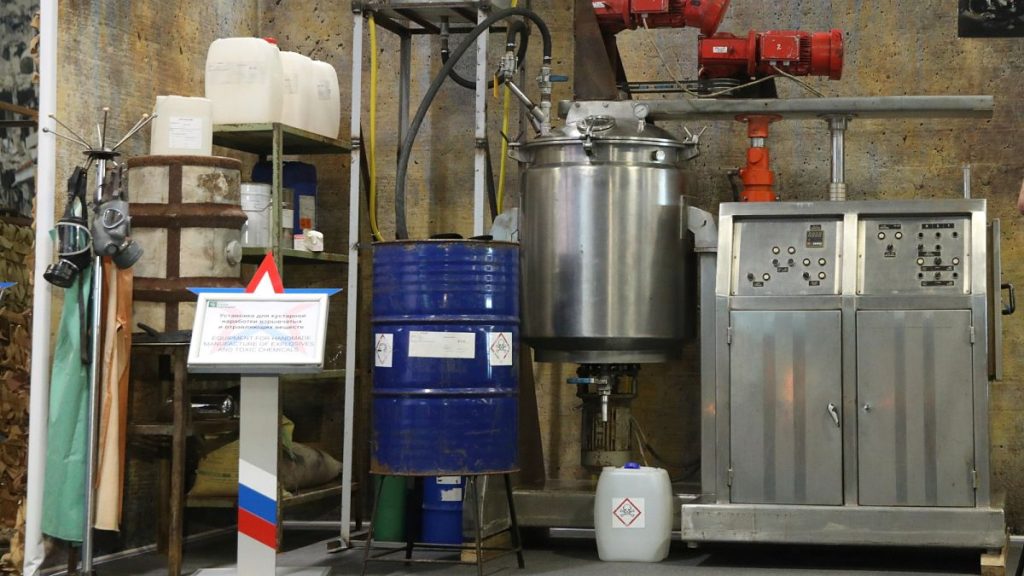In a significant development regarding the ongoing conflict in Ukraine, intelligence agencies from the Netherlands and Germany have reported an alarming increase in the use of banned chemical weapons by Russian forces. Among these, the deployment of chloropicrin—a poison gas originally used during World War I—has been highlighted. The findings depict a situation where chemical weapons use has become normalized and systematic within Russian military operations against Ukraine, raising international concerns about the escalation of conflict and the implications for global safety.
| Article Subheadings |
|---|
| 1) Escalation of Chemical Warfare in Ukraine |
| 2) The Role of Chloropicrin |
| 3) International Response to Chemical Weapons Use |
| 4) Implications for Global Security |
| 5) Future Actions and Sanctions |
Escalation of Chemical Warfare in Ukraine
The recent intelligence reports indicate a troubling trend in which the Russian military has increasingly adopted the use of chemical agents in its operations in Ukraine. This systematic approach has raised alarms about the potential normalization of such tactics in conflict zones. The use of banned chemical weapons now appears to be routine, suggesting a new phase in warfare that could lead to greater civilian and military casualties. Reports estimate that over 9,000 attacks involving chemical agents have occurred since Russia’s large-scale invasion of Ukraine began in 2022, demonstrating a startling departure from established norms of warfare.
The Role of Chloropicrin
Among the prohibited substances being deployed is chloropicrin, a chemical weapon historically associated with World War I combat. Initially a tear gas, chloropicrin causes severe respiratory issues and can incapacitate individuals in enclosed spaces. The Dutch and German intelligence agencies noted that the Russian military employs chloropicrin specifically to flush out entrenched Ukrainian soldiers, exposing them to gunfire. This tactic is not only inhumane but also contravenes international treaties like the Chemical Weapons Convention (CWC), to which Russia is a signatory. The CWC explicitly prohibits the use of substances like chloropicrin in warfare, demonstrating that the current actions by the Russian military significantly undermine global legal obligations.
International Response to Chemical Weapons Use
In response to the escalating situation, Dutch Defence Minister Ruben Brekelmans has called for enhanced sanctions against Russia and continuous military support for Ukraine. He emphasized the necessity of preventing the normalization of chemical weapons use, as a lower threshold for deployment poses risks not only to Ukraine but to Europe and beyond. The executive committee of the Organisation for the Prohibition of Chemical Weapons (OPCW) is expected to discuss the findings in an upcoming meeting, which could pave the way for a more stringent international response to Russia’s actions.
Implications for Global Security
The normalization of chemical warfare poses grave implications for international security. The use of such weapons can escalate an already volatile conflict, rendering efforts for peaceful resolution even more difficult. Other states may see the acceptance of such tactics as a precedent, potentially leading to a broader acceptance of chemical weapons in conflicts worldwide. The situation in Ukraine serves as a reminder of the fragility of international norms surrounding warfare and the shared responsibility to uphold standards designed to protect human life.
Future Actions and Sanctions
Looking ahead, several countries are considering necessary actions to address the alarming increase in chemical weapon use. Officials are advocating for tougher sanctions, with a focus on targeting military supplies to Russia. Experts believe that diplomatic measures, combined with economic pressure, may help in deterring further use of chemical agents on the battlefield. Additionally, the global community must intensify its commitment to the enforcement of the Chemical Weapons Convention and ensure that violations do not go unpunished, upholding human rights for all individuals affected by warfare.
| No. | Key Points |
|---|---|
| 1 | Intelligence agencies report increased normal use of chemical weapons by Russia in Ukraine. |
| 2 | Chloropicrin, a World War I-era poison gas, is a primary chemical being used. |
| 3 | The Dutch Defence Minister calls for more sanctions against Moscow and support for Ukraine. |
| 4 | The normalization of chemical weapons in warfare presents global security risks. |
| 5 | Future actions may include sanctions targeting military supplies and a push for strict enforcement of the CWC. |
Summary
The use of chemical weapons by the Russian military in Ukraine has escalated to alarming levels, with reports of chloropicrin being systematically employed against Ukrainian forces. This troubling trend not only violates international obligations but also threatens the stability of global security. As nations discuss responses to this situation, the focus remains on ensuring that such dangerous tactics do not become a norm in contemporary warfare. Continuous international support for Ukraine and stringent measures against violators of the Chemical Weapons Convention are crucial in addressing this urgent crisis.
Frequently Asked Questions
Question: Why is the use of chloropicrin notable in the current conflict?
Chloropicrin is notable because it is a prohibited chemical weapon that has been systematically used by the Russian military against Ukrainian forces, representing a significant escalation in the conflict.
Question: What is the Chemical Weapons Convention (CWC)?
The Chemical Weapons Convention is an international treaty that outlaws the production, stockpiling, and use of chemical weapons, aimed at preventing their employment in warfare.
Question: What actions are being considered in response to Russia’s use of chemical weapons?
There are discussions among international leaders about implementing sanctions against Russia and increasing military support for Ukraine, as well as reinforcing the enforcement of international treaties like the CWC.


